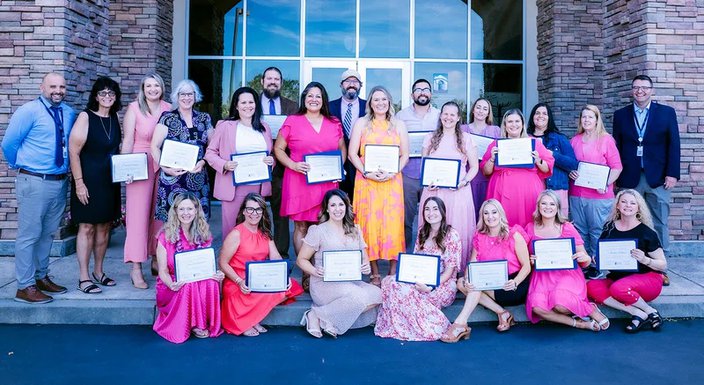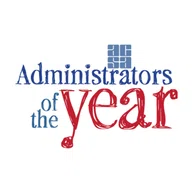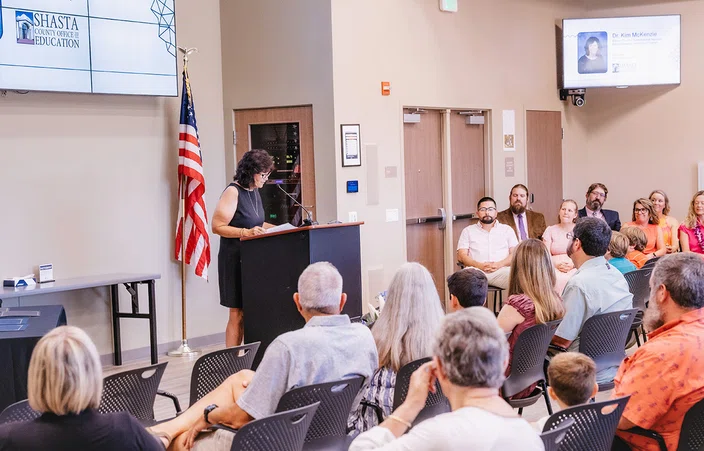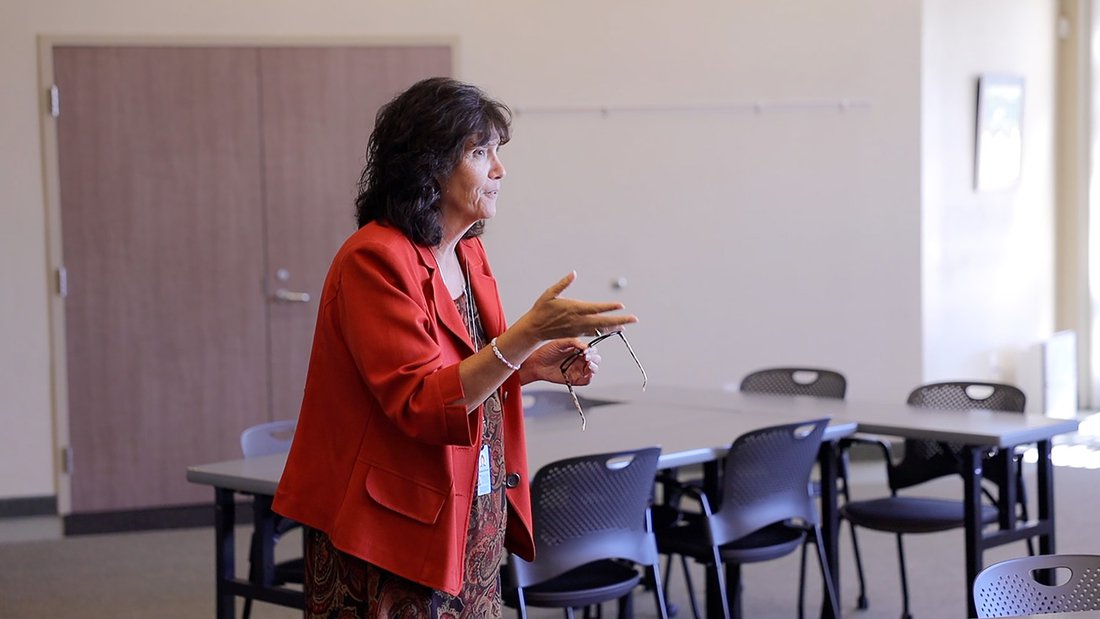
Dr. Kim McKenzie, standing second from left, poses with graduates from the Shasta Leadership Academy Class of 2025. McKenzie has supported the next generation of education leaders as a professor, credentialing program manager and leadership coach.

Name: Dr. Kimberlee McKenzie
Award: Professor of Education of the Year
Title: Senior Director of Professional Leadership, Shasta County Office of Education; Adjunct Professor at National University
ACSA highlights: Member since 2002; ACSA/CAPEA Committee, 2015-present; Region 1 Executive Board Member; ACSA Leadership Coach.
Administrators in the northern part of the state who have a leadership quandary know that Dr. Kim McKenzie is just a phone call away. Her promise to nurture leaders throughout their journeys — “from womb to tomb” — is evident in the advice, coaching and support she offers to administrators even long after they complete their credentialing programs.
Her ability to inspire confidence in future leaders has helped launch the careers of countless school administrators, and it has earned her the distinction of being ACSA’s 2025 Professor of Education of the Year.
McKenzie joined the Shasta County Office of Education 10 years ago and was tasked by then County Superintendent Tom Armelino with developing an administrative credential program to provide rural administrators with enhanced leadership training. She embraced this challenge and established the Shasta Leadership Academy, which has developed more than 300 administrators for school leadership roles in nine counties in Northern California.
In Shasta County, McKenzie is widely recognized for producing some of the highest-quality administrators through her program. She oversees both the Tier 1 Preliminary Administrative Services Credential and the Tier 2 Clear Administrative Services Credential, in addition to providing one-on-one coaching to new administrators.
“She has mastered the art of asking the right questions to build self efficacy in those she coaches,” said former student Jill North, program director of Alternative Education with Shasta County Office of Education. “She never gives you the answer and she never tells you what she would do. Instead she leads you to excavate understanding of the problem you never even knew you had. The answers come to you organically and build the capacity that you already possess.”
In 2024, her commitment to developing school leaders led to an innovative partnership between Shasta County Office of Education and the University of Arkansas to offer a hybrid doctorate in educational leadership program. Earning a doctorate is often cost prohibitive or inaccessible to administrators in rural parts of the state, but thanks to McKenzie’s work, local leaders now have access to the highest level of training to bring back to their region.
As an adjunct professor for National University, McKenzie has developed servant leaders who are committed to transformational change on their campuses. Her classes emphasize that every student deserves a safe and equitable educational experience.
Even after they leave her programs, McKenzie demonstrates her dedication to improving school-level outcomes by regularly visiting her former students’ schools and offering support to administrators during challenging times.
“For Dr. McKenzie, this work is about relationships and I am consistently blown away by the level of support that Kim provides to our program participants,” said Shasta County Superintendent of Schools Mike Freeman. “As we gather feedback from our participants, without fail, we see that the single greatest factor in the success of our students is the ‘whatever it takes’ support that Kim provides.”
What’s your favorite book or quote on leadership?
Favorite quote: “Great leaders don’t succeed because they are great. They succeed because they bring out the greatness in others.” — Jon Gordon. Favorite book: “Appreciative Leadership,” by Diana Whitney, Amanda Trosten-Bloom, and Kae Rader.
What’s the best advice you’ve ever been given?
Lead with empathy, act with clarity. Understand the experiences and challenges, while still making decisions based on my core values.
What’s your best strategy for work-life balance?
Setting boundaries — treating personal time with the same respect as my work time. I am still working on this!
What are some life hacks that you would recommend for a new administrator?
I am a firm believer in the walk and talk method — walking the campus and having check-ins with the staff, which boosts visibility, morale, and saves time.
What would people be surprised to learn about you?
People are often surprised to learn that I used to be anxious about public speaking. And ironically, most of my career has been about speaking in front of people. I regularly lead meetings and have even spoken at educational events. It’s a reminder to me that you can build confidence through practice and persistence.
What made you want to become a school administrator?
I still believe in kids! Even though I am no longer in the classroom, every decision I make is about helping students grow. Being an administrator allows me to support the future and influence others on how their own beliefs and decisions can make an impact.
What’s the biggest challenge you’ve overcome to get where you are?
Furthering my education while working full time as a school counselor and raising a son who was in kindergarten at the time. It taught me discipline, resilience, and how to manage my time. All skills that I would later rely on in being an educational leader.
What are you most proud of accomplishing?
Personally, my husband and I are raising our son to be kind and a contributor to society. Professionally, supporting the Shasta Leadership Academy Preliminary Administrative Services Credential program. Working with future educational leaders to pursue their dreams has been the opportunity of a lifetime!
How has ACSA supported you in your career/current position?
ACSA has played a pivotal role in my professional growth and success. Through its high-quality professional development opportunities, I've gained valuable insights and practical strategies that I regularly apply in my current role. The networking events and conferences have connected me with inspiring leaders and peers who have become mentors, collaborators, and friends. ACSA also keeps me informed about educational policy changes and advocacy efforts, which helps me stay proactive and informed as a leader. Overall, ACSA has been a consistent source of support, guidance, and community throughout my career journey.
The theme for this year’s Leadership Summit is “Lead Loudly: Sharing Stories, Building Bridges.” What does Lead Loudly mean to you?
Lead Loudly means taking a visible, vocal, and courageous stance in support of student, staff, and school values. It means being an outspoken advocate for equity and high standards. As the leader, ensuring that the school’s vision is not just a written strategic plan, but is actively modeled and reinforced in daily actions.

Dr. Kimberlee McKenzie's ability to inspire confidence in future leaders has helped launch the careers of countless school administrators

In Shasta County, McKenzie is widely recognized for producing some of the highest-quality administrators through her program.




